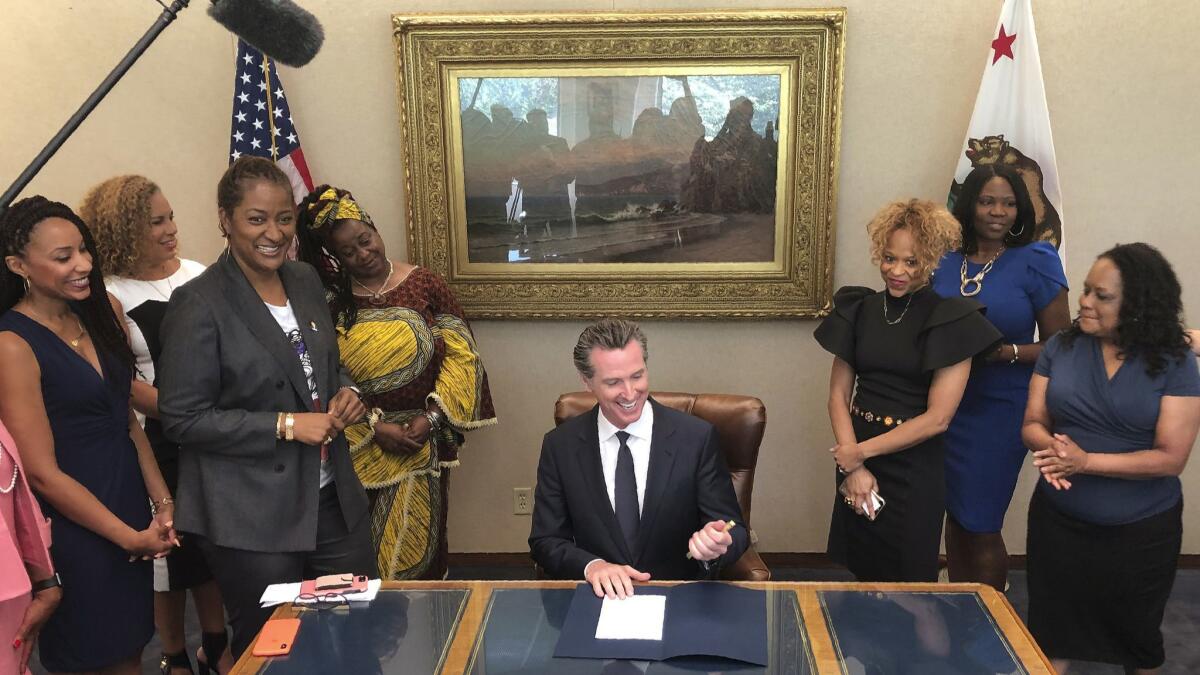California becomes first state to ban discrimination based on one’s natural hair

Reporting from Sacramento — California just became the first state to outlaw racial discrimination based on hairstyle.
Gov. Gavin Newsom on Wednesday signed a bill into law that legally protects people in workplaces and K-12 public schools from discrimination based on their natural hair. The new law, which takes effect Jan. 1, prohibits the enforcement of grooming policies that disproportionately affect people of color, particularly black people. This includes bans on certain styles, such as Afros, braids, twists, cornrows and dreadlocks — or locs for short.
Newsom said the need for the protection entered the national political consciousness in December when a referee forced a black wrestler for a New Jersey high school to cut his dreadlocks or forfeit his match. That indignity forced the student to choose whether to “lose an athletic competition or lose his identity,” Newsom said.
“That is played out in workplaces, it’s played out in schools — not just in athletic competitions and settings — every single day all across America in ways that are subtle, in ways overt,” Newsom said during a morning bill-signing ceremony at the Capitol in Sacramento.
California Gov. Gavin Newsom has signed his first budget. Here’s where the $215 billion will go »
The CROWN Act, which passed unanimously in both the California Assembly and Senate, adds traits historically associated with race to the state’s list of classifications protected from discrimination, including race, sex, religion, color, national origin, disability and sexual orientation.
Supporters have said the legislation’s acronym reflects its intention: creating a respectful and open workplace for natural hair.
The bill’s author, Sen. Holly Mitchell (D-Los Angeles), said the new protection provides all Californians the right to wear natural hairstyles without fear of repercussions. Students will be able to go to school, and workers do their jobs, without feeling pressure to change their appearance based on someone else’s “comfort level,” she said.
“For us, it is a symbol of who we are. I know when I locked 15 years ago, I knew it was both a social and political statement to the outside world,” Mitchell said.
Mitchell wrote the proposed legislation, SB 188, and before the Senate unanimously passed it, she described the bill’s purpose as twofold: to dispel myths about black hair, its texture and the black hair experience, and to challenge what constitutes “professionalism” in the workplace.
The bill has inspired similar legislation in other regions: New York City officially banned natural hair discrimination in February, saying that hairstyles are protected under the city’s existing anti-discrimination laws because policing black hair is a form of pervasive racism and bias. Lawmakers in New York and New Jersey also proposed legislation modeled after the CROWN Act in June.
RELATED: Black hair in Hollywood: five women share their stories »
More to Read
Sign up for Essential California
The most important California stories and recommendations in your inbox every morning.
You may occasionally receive promotional content from the Los Angeles Times.












